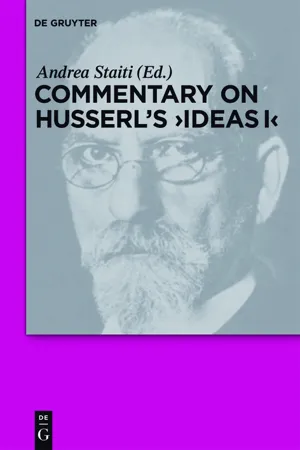
Commentary on Husserl's "Ideas I"
Andrea Staiti
- 352 Seiten
- English
- PDF
- Über iOS und Android verfügbar
Commentary on Husserl's "Ideas I"
Andrea Staiti
Über dieses Buch
Husserl's Ideas for a Pure Phenomenology and Phenomenological Philosophy (1913) is one of the key texts of twentieth century philosophy. It is the first of Husserl's published works to present his distinctive version of transcendental philosophy and to put forward the ambitious claim that phenomenology is the fundamental science of philosophy. In Ideas, Husserl introduces for the first time the conceptual arsenal of his mature phenomenology: the principle of all principles, the phenomenological epoché and reduction, pure consciousness, and the noema. All these difficult notions have been influential and controversial in subsequent philosophy, both analytic and Continental. In this commentary, thirteen leading scholars of Husserlian phenomenology set out to clarify and defend Husserl's views, connecting them to the vast corpus of his published and unpublished writings, and discussing the main available interpretations in the existing scholarship. The result is a detailed and comprehensive account of the most original form of transcendental philosophy since Kant's Critique of Pure Reason.
Häufig gestellte Fragen
Information
Inhaltsverzeichnis
- Contents
- Essental
- ntroducton
- “Who’d ’a thunk t?”<subttle/>Celebratng the centennal of Husserl’s deas
- ndvduum and regon of beng: On the unfyng prncple of Husserl’s “headless” ontology<subttle/>Secton , chapter 1, Fact and essence
- Transcendental normatvty and the avatars of psychologsm<subttle/>Secton , chapter 2, Naturalstc msconceptons
- The melody unheard: Husserl on the natural atttude and ts dscontnuaton<subttle/>Secton , chapter 1, The thess of the natural a ttude and ts suspenson
- From psychology to pure phenomenology<subttle/>Secton , chapter 2, Conscousness and natural actualty
- Phenomenologcally pure, transcendental, and absolute conscousness<subttle/>Secton , chapter 3, The regon of pure conscousness
- Layng bare the phenomenal feld: The reductons as ways to pure conscousness<subttle/>Secton , chapter 4, The phenomenologcal reductons
- Clarty, fcton, and descrpton<subttle/>Secton , chapter 1, Methodologcal pre-consderatons
- Phenomenology of reflecton<subttle/>Secton , chapter 2, Unversal structures of pure conscousness
- Noetc moments, noematc correlates, and the stratfed whole that s the Erlebns<subttle/>Secton , chapter 3, Noess and noema
- Concepts wthout pedgree: The noema and neutralty modfcaton<subttle/>Secton , chapter 4, On the problems of noetc-noematc struc ures
- The Doctrne of the noema and the theory of reason<subttle/>Secton V, chapter 1, The noematc sense and the relaton to the objec
- Reason and experence: The project of a phenomenology of reason<subttle/>Secton V, chapter 2, Phenomenology of reason
- Husserl’s analogcal and teleologcal concepton of reason<subttle/>Secton V, chapter 3, Levels of unversalty of the problems of a theory of reason
- Appendx: A Map of the noess-noema correlaton
- Authors
- Index